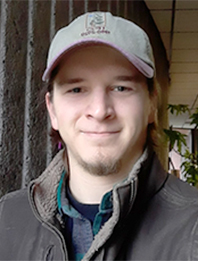
The LandVest informatics team is excited to announce the addition of a new intern, Logan Wimme. Logan is currently a graduate student with the University of Idaho where his studies and research focus on forest biometrics, modeling, and spatial analysis. Prior to his graduate career, Logan earned his Bachelor of Science in forest management from the University of Wisconsin-Stevens Point. Additionally, he has previous work experience in both private and government sectors of the forestry community.
Logan’s internship with LandVest is funded through an exciting opportunity provided by the National Science Foundation (NSF). NSF recognizes the importance of preparing the nation’s up-and-coming researchers and workforce professionals, and thus they established a program to provide supplemental funding for graduate students through non-academic internships. These internships are designed to prepare students for post-academic careers by aiding in the development of professional skills, providing exposure to real-world scenarios, and allowing students to work and build relationships within collaborative teams.

LandVest and the University of Idaho worked together over the course of several months to finalize and submit an NSF internship application. The application navigated a rigorous selection process before it was chosen and the internship was granted. This collaboration between LandVest and the University of Idaho will provide benefits for both parties while simultaneously creating an unparalleled learning experience for Logan.
As part of the internship, students are required to conduct a research project within their field of study. Logan’s project will primarily focus on researching ways to effectively conduct rapid forest inventory using UAS-based methods. Potential findings of Logan’s research will ideally be used to streamline forest inventory processes and increase efficiency for other large-scale data collections.

In addition to Logan’s research project, he will be exposed to numerous other opportunities as a result of this experience. These opportunities include 1) exposure to large scale forest management and industrial forestry processes that would not be a part of a typical graduate research project, 2) becoming proficient in solving real-world needs through the application of his education and on-the-job training, 3) developing skills with new technologies that provide more accurate and efficient data collection to aid in strategic business decisions and forest operations, and 4) broadening his network of peers and colleagues.
